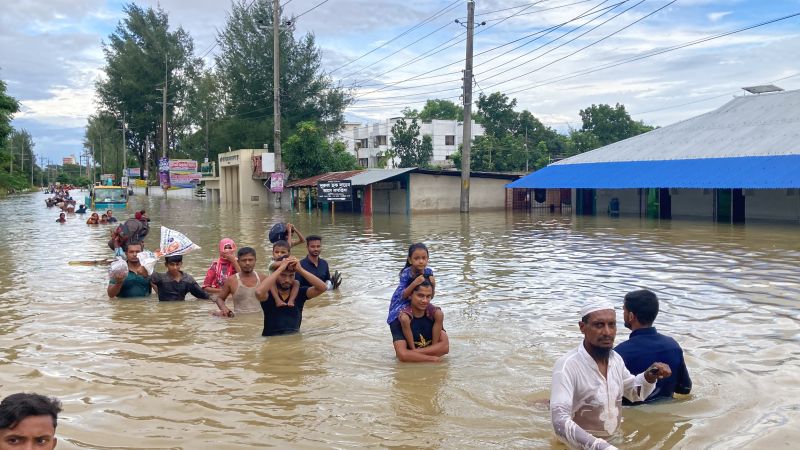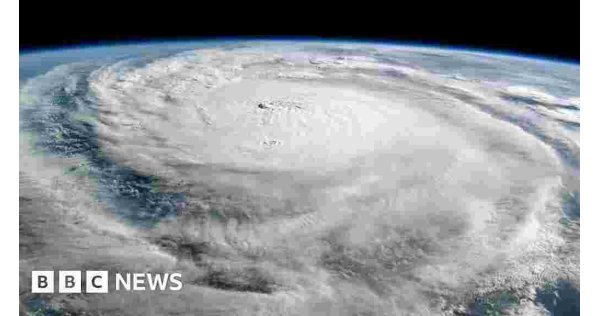The floodwaters in Feni, Bangladesh, are chest-high and relentless. Hundreds of people, their possessions held precariously above the murky water, trudge toward higher ground. The city, home to nearly 1.5 million, is at the heart of a devastating flood, one of the worst in recent memory. Since Wednesday night, water has engulfed eleven districts, leaving vast stretches of land submerged.
Bangladesh, a nation interwoven with rivers and waterways, depends on these life sources for sustenance. Its people farm rice paddies and fish these waters, their lives intertwined with the ebb and flow. They are no strangers to floods and cyclones, especially in recent years as climate change intensifies extreme weather events. Yet, this flood arrived with an unexpected fury, and many in Feni place the blame squarely on India.
Just a few miles from the Indian border, resentment simmers. Dozens of residents in Feni accuse New Delhi of releasing water from the Dumbur dam in neighboring Tripura state without any warning. Their anger is palpable, cries of "We hate India" and "This is Indian water" echoing through the flooded streets.
Shoriful Islam, a 29-year-old IT worker who returned from Dhaka to assist in rescue efforts, voices the community's frustration. "They opened the gate, but no information was given," he says, echoing the sentiment of many. He believes it's a calculated act of retaliation, stating, "India used a water weapon. India is taking revenge for destroying the last government."
India, however, denies any deliberate action. Officials maintain that the dam release was automatic, triggered by excessive rainfall. They acknowledge a power outage and communication breakdown hindered their ability to issue the usual warnings to their downstream neighbors.
The flood's impact is catastrophic. Access in and out of the flood zone is restricted to boats, with all major roads impassable. Rescue efforts are hampered by the lack of electricity and a near-total communication blackout. The army and navy are coordinating relief efforts, but the situation is dire.
Volunteer Abdus Salam, an English teacher from Dhaka, fears for his family – twelve members, including his siblings, their children, are stranded miles away. "I don't know if they are alive," he confesses, his voice choked with emotion. He pleads for international assistance, highlighting the dire lack of basic necessities – "no electricity, no gas, no internet."
The human cost of the flood is staggering. Nearly 5 million people in Bangladesh are impacted, with the death toll at 18 and expected to rise. In India, at least 26 have died, and over 64,000 seek refuge in relief camps.
While rescue workers battle the logistical nightmare, a diplomatic row brews. Pranay Verma, India's high commissioner to Bangladesh, attributes the flooding to an "automatic release" from the dam due to high water levels. However, many, including Nahid Islam, a student representative in Bangladesh's interim government, remain unconvinced. "India displayed inhumanity by opening the dam without warning," he asserts, linking the event to the recent political upheaval in Bangladesh.
The recent ousting of Prime Minister Sheikh Hasina, after a student-led movement against her government and subsequent crackdown, has fueled these suspicions. Hasina, who had strong ties with India's Prime Minister Narendra Modi, fled to India amidst protests. The flood, in the eyes of some, is seen as retaliation for her removal.
India's Ministry of External Affairs vehemently denies these allegations, calling them "factually incorrect." They attribute the flooding primarily to water flow from the Gumti River's catchment areas, downstream from the dam. They emphasize the need for cooperation, stating, "Floods on the common rivers between India and Bangladesh are a shared problem inflicting sufferings to people on both sides, and requires close mutual cooperation towards resolving them."
Despite the diplomatic back-and-forth, the reality on the ground is one of desperation and fear. Rescue teams face immense challenges. The journey from Dhaka, normally a four-hour drive, now takes twice as long due to gridlocked roads. Boats are scarce, leaving families stranded and desperate for news of their loved ones.
Yasin Arafat, 24, traveled from Dhaka to find his family. He's heard of 35 families, including two pregnant women, trapped on a rooftop in his flooded village, a three-hour boat ride away. He remains unable to find a boat and the wait is agonizing. “They have no water, no food, and they’re very scared," he says, his voice filled with anguish. "In the last 48 hours, I haven’t had any news.”
Even with a boat, navigating the flooded city is perilous. Sections require boats to be physically carried over land, a testament to the flood's devastating reach. People wade through chest-high, contaminated water, risking disease and drowning, desperate to reach safety.
The stories of loss and fear are endless. Peyara Akther, 36, desperately searches for her sister and her sick newborn baby. She fears for the baby's life, knowing the infant hasn't eaten in days. The communication blackout makes the search even more harrowing.
Amidst the devastation, acts of courage and resilience shine through. A security guard working in Qatar flew back to Bangladesh upon hearing about the flood, determined to rescue his 55-year-old mother. Unable to reach her due to her remote location, he uses his resources to help other stranded families.
As night falls, the rescue operations continue, a race against time. The people of Feni cling to the hope of survival, praying that aid arrives before the floodwaters claim more lives.
Millions in this country are stranded by flooding. Many blame their neighbor
Wading through muddy floodwaters up to chest height, hundreds of people slowly make their way to safety, their belongings held high above their heads to keep them dry.

Related Posts

Los Angeles has made history with its first-ever restaurants receiving three Michelin stars. This prestigious recognition highlights the city's culinary excellence and elevates its dining scene.

How unusual has this hurricane season been?

